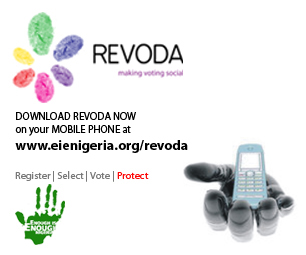This post is part of our special coverage Nigeria Elections 2011.
As the 2011 Elections in Nigeria draws near, the blogosphere is fervent with loud screams. Nigerian bloggers are busy talking but creating a national conversation about the future of their country.
Nze Sylva Ifedigbo starts the New Year with a post disparaging the bomb blasts that sent some Nigerians to an early embrace with their ancestors. It is pathetic that violence continually reoccurs in Nigeria’s political equation:
It’s the first day of the year that promises to be very exciting. Top on the list no doubt for most Nigerians is the general elections scheduled for April. Kick starting the process for this election is the voters’ registration which will commence this month. How ready are we to make this opportunity count? Sadly though, our celebration was hijacked once more by some faceless cowards who detonated a bomb in the usually crowded mammy market of the Mogadishu Cantonment (Sani Abacha barracks) Abuja on New Year Eve.
Felix Okoli lays the bulk at the table of the Independent National Electoral Commission (INEC) and particularly on its boss Attahiru Jega:
The mantle has fallen on Jega to ensure that the 2011 Presidential and general elections sail smoothly and the results be an honest reflection of the wishes of the great people of Nigeria.
The Voters Registration was a litmus test on INEC unpreparedness to conduct a credible election. Nigerian Curiosity asserts that:
These first days also raise questions about the preparedness of the Independent National Election Commission (INEC) and its ability to not only register voters within the time allotted but also conduct free and fair elections in April.
Elections are about numbers. The wave of social media backed revolutions in North Africa has raised the consciousness of many. It is therefore not surprising that the party primaries were followed with much more than a passing interest. Nnenna writes that:
In Nigeria, I followed the #PDPprimaries. …All this time, I was waiting…typing, tweeting… with thousands of other Nigerians all over the world? Why? Because the one that wins #PDPprimaries is almost certain to win the Presidency. #PDPprimaries lasted 15 hours. The final results were announced at around 7 am the next morning. We kept awake! Every single count was on web radio, on Twitter, on Facebook.
Feathers Project thinks that the 2011 elections will be different because of the numerous independent election observers in the country.
…the 2011 elections seem to be too important to be left for politicians alone. Familiar names like Vote or Quench, RSVP (Register, Select, Vote and Protect), If Naija Votes, have assumed buzz status.

ReVoDa, a mobile app that provides untrained citizens with a tool to share their election experiences. Source: ‘Gbenga Sesan blog
Gbenga Sessan confirms the strength of social media in this election with the development of a new app – ReVoDa which:
…turns the 87,297,789 Nigerians with mobile phones, 43,982,200 with internet access and 2,985,680 on Facebook into informal election observers.
Eurukanaija has some advice for the First Lady, whose English expletives have morphed into a national lure:
D tin consan the campaign wey you dey helep our Presido, Uncle Jo and all im ‘umblerra’ friends do. Auntie, you try. Even though you no too sabi English, you dey make effort…
It seems not only the bloggers are talking but the musicians are also singing. The civic awareness campaign for this election that has already gone viral online has been given a voice. Trading Places expresses it thus:
Through Twitter, Eldeethedon, one of several musicians, urged people to “be the change” and Register Select Vote Protect.
This post is part of our special coverage Nigeria Elections 2011.







7 comments
yes o thats all people are talking about – elections elections election!!
Gbenga, I hope we do more than talking. We either vote or quench!
Ples we aplie 2 all nigerias 2 b in peace during dis up coming election
Great post, Nwachukwu. Welcome to GV!
Many thanks Eremipagamo.
Thanks for featuring the ReVoDa picture on your blog. As I stated on another blog recently: Nigerians are probably already too used to the once-in-4-years defeat and some of us would rather not try. But recent events – dating back to 2007 – seem to point in a different direction. From the 2007 sham across Nigeria to the 2008 Obama craze to news of upturned elections in 2009 and the Yar’Adua saga of 2010, the Nigerian electorate might have picked up enough strength to allow the silent minority speak up – and act too. 2011 will not be perfect, but it’ll make clear the possibility of “governments” being afraid of citizens. Youth, technology and change opportunities are the three factors that I think are aligned in the many waves we see across the world today. It appears that young Nigerians are not smiling, appropriate technology application is now popular, and 2011 is a unique change opportunity. In the next 4 weeks, I hope the discussion is about how all the anger we see around today was put to work via the ballot, using tools like ReVoDa to protect our mandate.
Brilliant work NE. Captures the many views, opinions and wishes for this year. In many ways, some of them are already coming to pass while we step into the period of actualization of some others especially the Elections. I wish all Nigerians well.